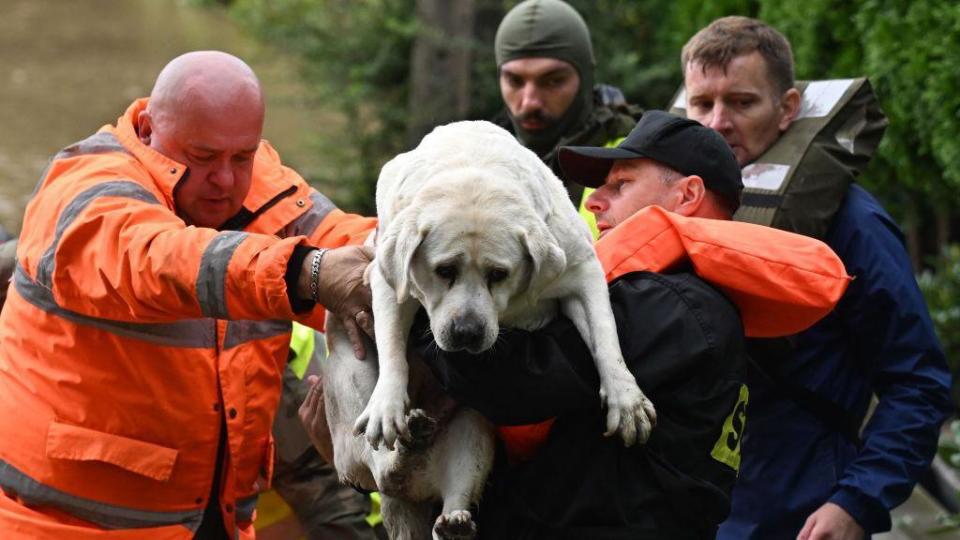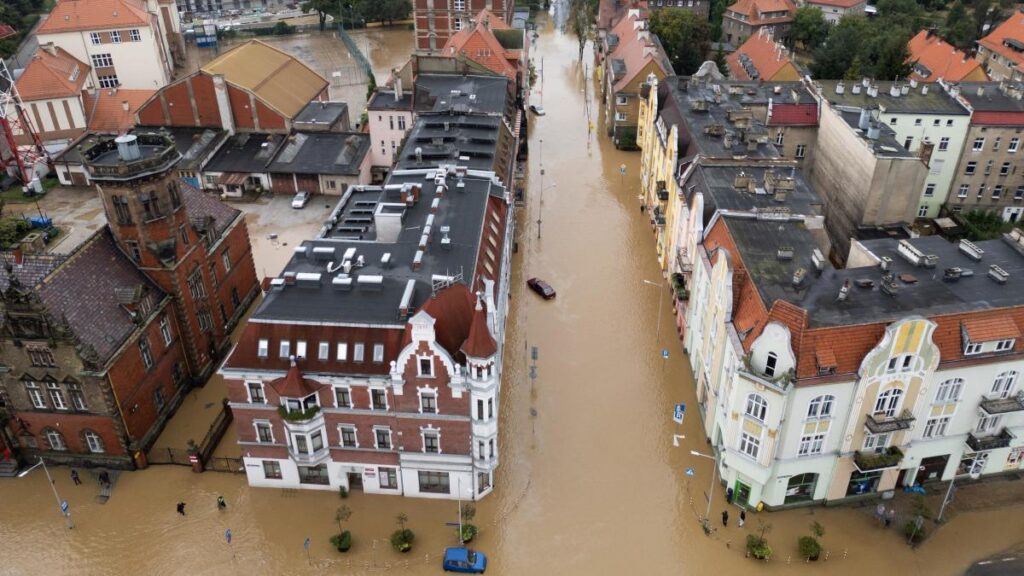The mayor of a Polish city has asked all 44,000 residents to evacuate as large parts of Central Europe are hit by widespread flooding.
Nysa Mayor Kordian Kolbiarz urged people to move to higher ground, citing the risk of a dike breaking and a cascade of water from a nearby lake flowing into the city.
On Monday, the death toll from floods that hit Central Europe over the weekend rose to 16, with more victims recorded in the Czech Republic, Poland and Austria.
Budapest has announced it will close roads near the Danube River, which flows through the city, due to the risk of flooding later this week.
“Please evacuate your belongings, yourself and your loved ones. It is worth going to the top floor of the building immediately, because the wave can be several meters high. This means that the entire city will be flooded,” wrote Mayor Kolbiarz.
Polish Prime Minister Donald Tusk said one billion zloty (£197m) would be allocated to flood victims in the country, adding that Poland would also apply for EU aid funds. His government has also declared a state of natural disaster.
While conditions in some places have now stabilized, other places are bracing for further disruption and danger.
In Slovakia, the overflowing Danube River led to flooding in the old town of the capital Bratislava. According to local media, the water level was over 9 meters (30 feet) and was expected to rise further.


Hungary is bracing for flooding in the coming days, with warnings in place along 500 km (310 miles) of the Danube.
The water level in the river rises by about one meter every 24 hours, which is why the mayor of Budapest has offered the residents one million sandbags as protection against the flood water.
Some tram lines are not running, while riverside roads in the Hungarian capital will be closed from Monday evening. Trains between Budapest and Vienna have also been cancelled.
Prime Minister Viktor Orban said on X that he had postponed all his international obligations “due to the extreme weather conditions and the ongoing flooding in Hungary”.
The highest rainfall has been in the Czech Republic. In the northeastern city of Jesenik, 473 mm (19 inches) of rain has fallen since Thursday morning – five times the average monthly rainfall.
Czech fire brigades delivered bottled drinking water to the stranded villages. People were told not to drink water from the tap or from their wells, as the water is probably heavily contaminated.
In the Austrian town of St Polten, more rain fell in four days than in the wettest autumn ever recorded, in 1950.
Chancellor Karl Nehammer said the armed forces had been deployed to help areas hit by the storms. Austria’s climate ministry said €300 million (£253 million) in recovery funds would be made available.
Most parties have suspended their campaigning for the federal elections, which will take place in less than two weeks, on September 29.
Villages and towns in eastern Romania were flooded. Emil Dragomir, mayor of Slobozia Conachi, told media that the floods had had a devastating impact.
“If you were here, you would cry right away, because people are desperate, their whole life’s work is gone, there are people who only have the clothes on their backs,” he said.
Thousands of people have been evacuated in Poland, including staff and patients at a hospital in the city of Nysa. Roads are severely disrupted and rail services have been halted in many parts of the country.
On Monday morning, the mayor of Paczków in southwestern Poland appealed to residents to evacuate after a nearby reservoir overflowed, putting the town at risk.
In other parts of Poland, the water level is now falling, local authorities report.
The mayor of the city of Klodzko, Michal Piszko, told Polish media that the water had receded and that signs indicated the worst was over.
Video footage from Monday morning shows that streets in the city centre that were still under water on Sunday are now free of water. However, the footage also shows the extent of the damage to buildings.
Where is Storm Boris going now?
More rain is expected in Austria, the Czech Republic and south-east Germany on Monday and Tuesday, where another 100 mm could fall.
Although it may take days for the water to subside, the weather in Central Europe will improve from the middle of the week and become much drier.
Storm Boris will now move further south into Italy, where it will intensify again and bring heavy rain. The Emilia-Romagna region will be hit hardest, with 100-150mm of rain.
The record rainfall in Central Europe is caused by a number of factors, including climate change.
Several weather conditions came together to create a ‘perfect storm’ in which very cold air from the Arctic met warm air from the Mediterranean.
Another consequence of atmospheric pressure was that Storm Boris stayed in one place for a long time.
Scientists say a warmer atmosphere holds more moisture, leading to more intense rainfall. Warmer oceans also lead to more evaporation, which feeds storm systems.
For every 1C increase in the Earth’s average temperature, the atmosphere can about 7% more moisture.







